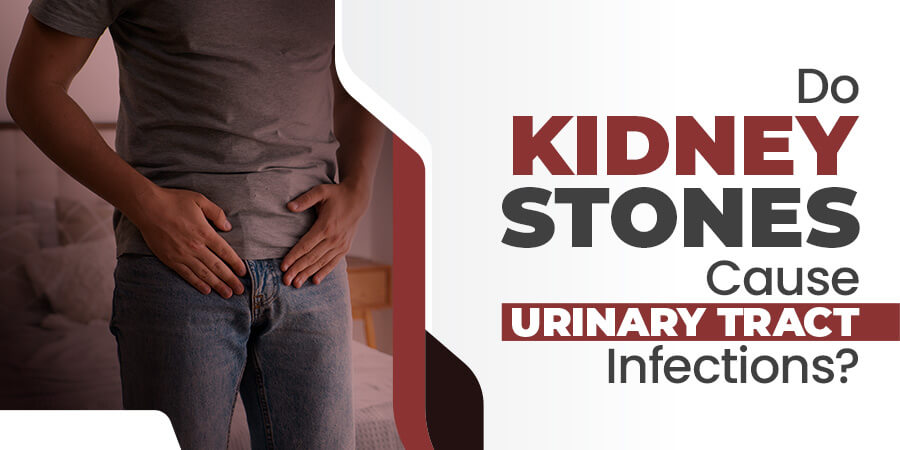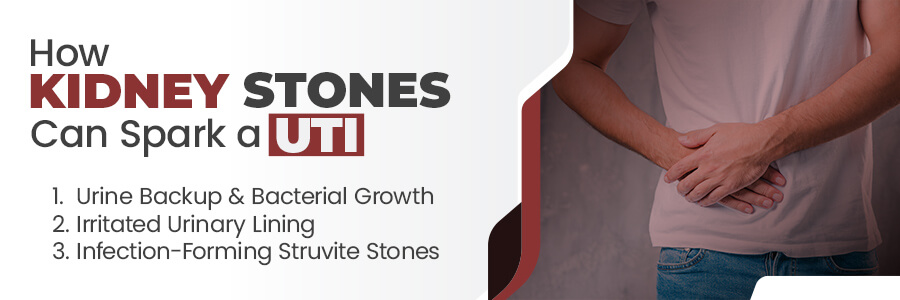To schedule an appointment call: 1 (800) 605-0031
To schedule an appointment call: 1 (800) 605-0031

It happens too often – sudden, sharp pain in your side or a burning sensation when you pee. Naturally, you wonder: did that kidney stone just lead to a UTI? Or was it the other way around? It’s a confusing and often painful puzzle. Do kidney stones cause urinary tract infections? Let’s take you through what happens and how to protect yourself.
Kidney stones are tiny, hard mineral deposits—like sand or pebbles—forming in your kidneys when chemicals like calcium, oxalate, or uric acid concentrate too much in urine. They can be innocuous or excruciatingly painful, especially if they block a ureter.
UTIs, on the other hand, are infections caused by bacteria like E. coli entering your urinary tract—urethra, bladder, or kidneys – triggering pain, urgency, and burning. Women are more prone, but anyone can get a UTI.

Stones can block urine flow, leading to stagnant pockets where bacteria grow unchecked—an ideal breeding ground.
Sharp stones can scratch the urinary tract, break its protective barrier and let bacteria hitch a ride.
Some bacteria release urease, turning urine alkaline and creating struvite stones—blurring the line between stone-caused UTI and UTI-caused stones.
Yes. Recurrent UTIs, especially those involving urease-producing bacteria, can lead to infection stones like struvite. We’ve often encountered such cases at our department of Urology Care Samaritana. Studies show an overlap: 18–36% of stone cases come with UTIs and vice versa.
• A 19-year UK study tracked people with stones and found they were about 5.7 times more likely to have a UTI.
• Struvite stones, which are directly formed by UTIs, show up in 88% of infections with urease-positive bacteria.
• In Taiwan, 34% of pediatric stone cases had concurrent UTIs.
So yes – a stone may spark a UTI, and a UTI can foster a stone. It’s a frustrating cycle.
• Removing stones (like from ureteroscopy or shock-wave treatments) often clears persistent UTIs.
• Stones can hide bacteria, allowing infections to linger even after antibiotics.
• Treating stones AND UTIs together reduces recurrence and protects your kidneys.
Spot the Symptoms Early
Since kidney stones and UTIs share symptoms, it’s easy to get them mixed up!
| Symptom | Can Indicate Kidney Stone | Can Indicate UTI |
| Sharp side or back pain | Yes | Rare |
| Urgency or frequent urination | Yes | Yes |
| Burning when peeing | Yes | Yes |
| Cloudy/smelly urine | Yes | Yes |
| Blood in urine | Yes | Sometimes |
| Fever/chills | Possible with stones | Likely, especially with UTI |
If symptoms overlap, consult a doctor. Your care plan depends on accurate diagnosis—stone removal, antibiotics, or both.
Drinking plenty of water keeps urine diluted to reduce both stone formation and bacterial growth.
Watch salt, sugar, and animal protein intake to prevent stones. Cranberry juice and good hygiene help lower UTI risk.
Early antibiotics stop infections before they lead to stones.
For stones, doctors may analyze composition and recommend diet or medication. For UTIs, proper testing and full antibiotic courses matter.
Imaging tests and urine cultures help catch stones or infections before they escalate.
Seek medical care if you experience,
• Severe flank pain or blood in urine
• Burning with urination, fever, chills
• Inability to urinate or unbearable pain
These could indicate blocked stones or serious UTIs. Timely action prevents infection spread and kidney damage.
So, do kidney stones cause urinary tract infections? Yes, kidney stones can lead to UTIs—especially if they block urine flow, damage the urinary tract, or form when infection-causing bacteria are present. UTIs can also spark struvite stones. Both conditions often go hand in hand, and treating them together brings better, longer-lasting relief. Protect yourself with hydration, healthy habits, early treatment, and medical guidance to break the cycle and keep your urinary system healthy. Contact our Urology department at Samaritana Medical Clinic Los Angeles to book an appointment with one of our urologists.
Must Read: What Is Pediatric Care? How It Differs from Regular Healthcare
A1. Yes, it’s possible to have both at once. A kidney stone can cause a blockage, leading to infection, while an untreated UTI can create conditions for certain stones to form. When both happen together, symptoms often feel worse and need urgent attention.
A2. Not always. Many kidney stones pass without any infection. But if a stone blocks urine flow or injures the urinary tract, bacteria can settle and cause a UTI. So, while not guaranteed, the risk is definitely higher.
A3. Antibiotics treat UTIs but don’t break down kidney stones. However, if a stone is infected, antibiotics are needed before removal to prevent complications. Stones usually need other treatments like surgery or shock wave therapy.
A4. Women are generally more prone to UTIs due to anatomy, but when it comes to kidney stones leading to infections, both genders are at risk—especially if the stones are large or block urine flow.
A5. Kidney stones cause sharp pain in the back or side, while UTIs usually bring burning and frequent urination. If you’re unsure, see a doctor—imaging and tests are the only way to know for sure.